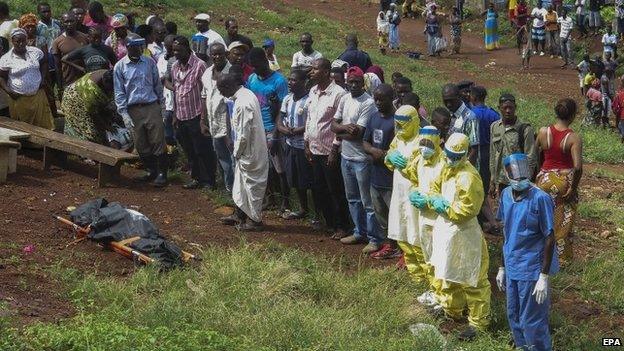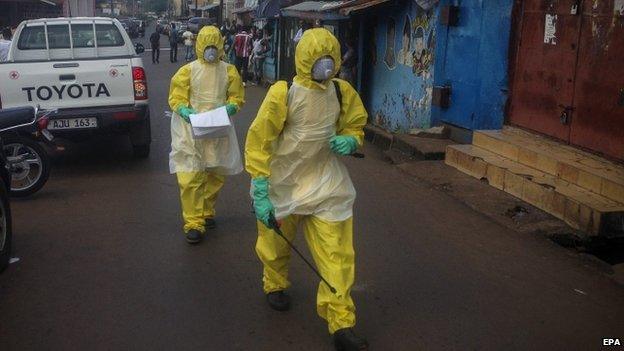On the frontline in Sierra Leone as Ebola virus spreads
- Published

Prayers are said for a victim of Ebola in Freetown, Sierra Leone
A smooth tarmac road runs through the middle of Kigbal village in Sierra Leone. On the east side of it, perhaps 30 children stand clustered in the shade.
"We came to this side to be safe," says 14-year-old Mabinti Kamara, glancing at the mud homes across the road and a dark silhouette beneath a tree.
"A lot of people died there. They took my father away. I don't know what happened to him," she says.
I ask the children to raise their hand if they have lost their parents to Ebola.
In silence, almost every child puts both hands in the air. Several of them look feverish.
Struggling local health officials now describe Kigbal as "the epicentre" of a new surge of Ebola infections in this region about 4 hours drive north of Sierra Leone's capital, Freetown.
Some 30 villagers - 10% of the population- have died in recent days.
Bodies everywhere
It is easy to see why the children have gathered on the east side of the tarmac. On the opposite side, two women and a four-year-old girl lie almost hidden in the shade.
"My head is turning," says Adamsay Kamara weakly as we walk across the road and stand a few metres away from her.
"She has Ebola. We cannot go any closer," warns Alimamy Baymaro Lamina II, the Paramount Chief of Lokomasamma - an area that includes the village.
Hours earlier, he explains, a burial team came to collect some of the bodies that were lying in the dirt outside the houses here.
"The bodies were everywhere - everyone in these houses is dead," he says.

In Freetown, Sierra Leone's capital, Ebola cases are six times higher than two months ago
A few yards away, an elderly man is standing outside his home, shouting for our attention.
"Please. Please. Cure her. Cure her," says Momo Sessey, pointing back towards his wife, Fatu Kanu, who is slumped on a wooden bench, coughing.
"I am afraid of her. I cannot touch her. Please take her to hospital," says Mr Sessey.
Then he asks for advice about how to treat his wife. We give him some protective gloves and urge him to give her water. "Hot or cold?" he asks.
Chief Lamina shakes his head and turns away in frustration.
Dr Stacey Mearns talks of the "shocking" conditions on the ground as she works on the Ebola frontline in Sierra Leone
"It makes me angry. I've been calling, and calling, and not getting any help yet. I go to meetings. I ask WFP and WHO for help and they say they're coming to your rescue but nothing..." the chief's voice tails off.
The director of an orphanage in Freetown has been twice to bring food for the children, but officials trying to coordinate the aid effort in the nearby town of Port Loko privately express frustration with the slow speed of the international humanitarian effort in the area.
Seven of Kigbal's most vulnerable children - some visibly feverish - have now been taken a mile down the road by a local health worker in the hope of offering better quarantine than a few yards of tarmac.
"My head hurts," says six-year-old Alusin before walking back to sit in the shade with the other boys and girls.
Beside them, two adults - one of them coughing violently - lie on the concrete floor.
Ebola deaths
Figures up to 13 January 2016
11,315
Deaths - probable, confirmed and suspected
(Includes one in the US and six in Mali)
-
4,809 Liberia
-
3,955 Sierra Leone
-
2,536 Guinea
-
8 Nigeria